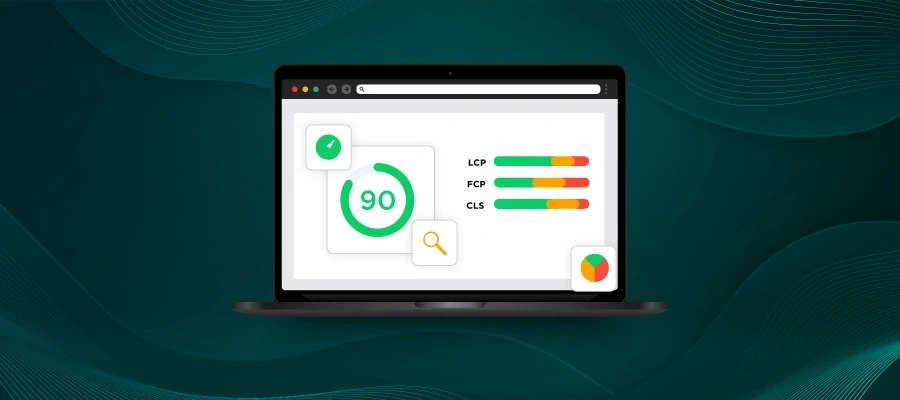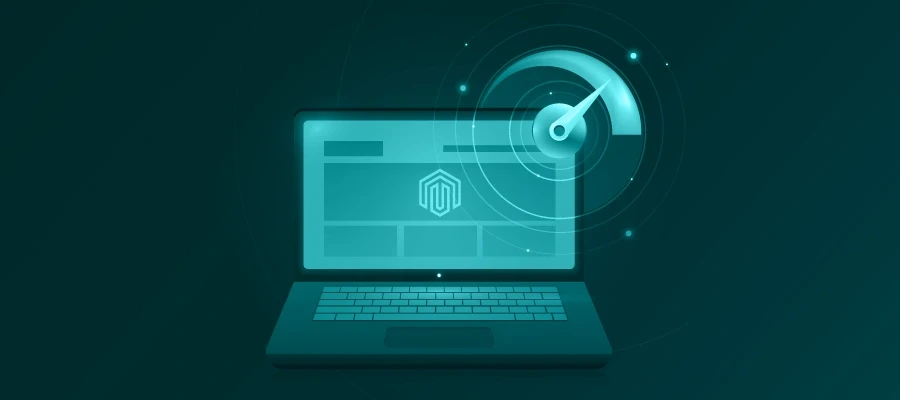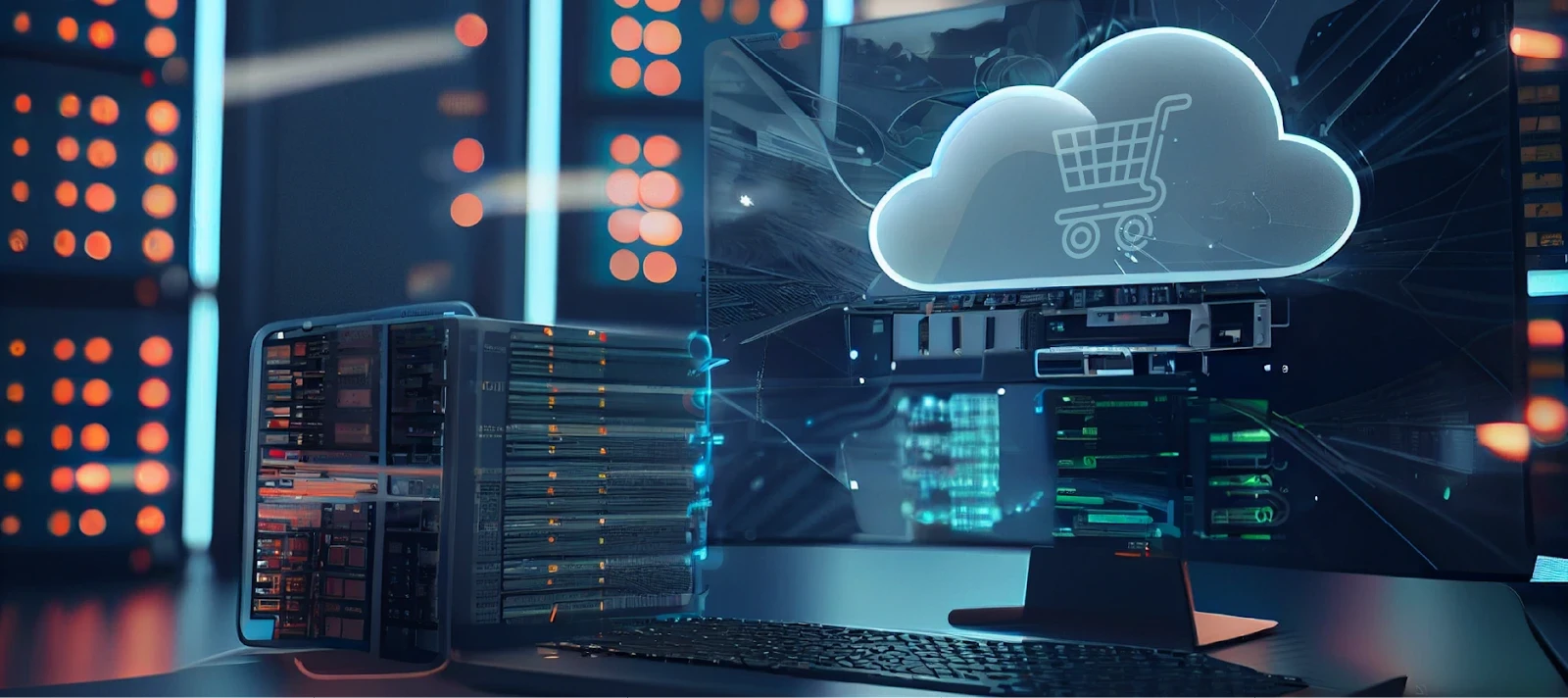Before we apply elements of implementing observability measures for ecommerce businesses, we need to understand what general observability is.
What is Observability?
Observability is the ability to understand the internal state of a system based on the data that is outputted. In the context of ecommerce and digital experience, observability is important because it allows businesses to understand how their systems are performing and identify potential problems before they impact customers.
What are the Benefits of Improving Observability in Ecommerce?
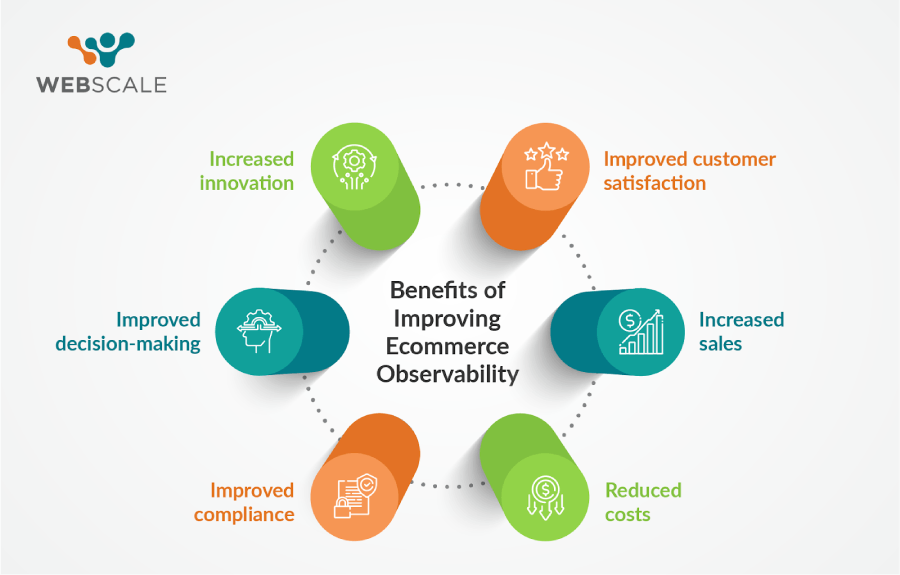
- Improved customer satisfaction: By identifying and fixing performance issues quickly, businesses can improve the customer experience and reduce the number of bounces from their storefront and ultimately reduce the total number of abandoned carts.
- Increased sales: By optimizing their performance and ensuring that they are meeting the needs of their customers, businesses can get more customers all the way through the checkout process.
- Reduced costs: By identifying and fixing problems before they become a disastrous event, businesses will reduce the negative impacts associated with downtime and outages.
- Improved compliance: By monitoring their systems and understanding how users are interacting with them, businesses can ensure that they are meeting the regulatory requirements of their industry when it comes to customer data and private information.
- Improved decision-making: By having access to real-time data, businesses can use these insights to make better decisions about how to improve their online operations.
- Increased innovation: By understanding how users are interacting with their websites, storefronts and applications, businesses have access to very important data points that should be used to identify new opportunities for innovation in their competitive industries.
How can I Improve Observability Measures in Ecommerce?
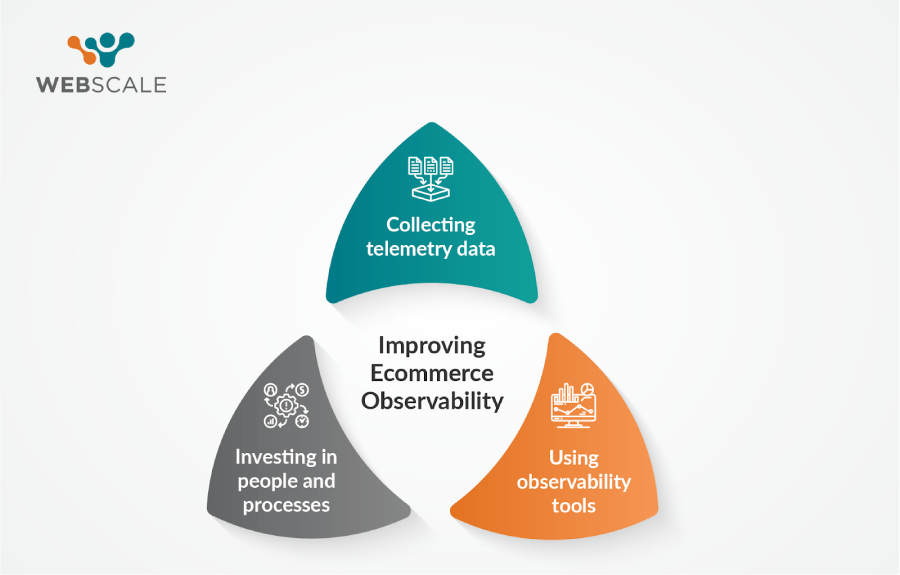
- Collecting telemetry data: Telemetry data is data that is automatically collected from a system, such as logs, metrics, and traces. Collecting telemetry data is the first step in the direction of improving observability measures.
- Using observability tools: There are a myriad of observability tools available, such as APM tools, log management tools, and anomaly detection tools. Using observability tools are essential to collect, analyze, and visualize telemetry data.
- Investing in people and processes: Improving observability requires investment in people and processes. Businesses need to have people who are skilled in collecting, analyzing, and visualizing telemetry data. They also need to have processes in place for responding to incidents. Quite often, it is better to outsource people and processes to a third party managed services provider (MSP) who has already built domain expertise as it pertains mapping the data collected to your business impacts.
To Webscale, observability measures are a critical component for supporting ecommerce businesses that want to ensure that they are providing a high-quality experience for their customers. By monitoring their systems and understanding how users are interacting with them, our team can be more effective to identify and fix problems quickly, optimize their performance, and drive more sales.
Are RUM and Observability the Same Thing?
No, RUM and observability are not the same thing. RUM is a subset of observability.
What is RUM?
Real user monitoring (RUM) is a method of tracking and analyzing the performance of a website or application from the perspective of the end user. This is done by collecting data from users’ browsers, such as page load times, error rates, and user engagement metrics. This data can then be used to identify and fix performance issues which lead to an improved user experience.
Why is RUM Important for Ecommerce?
Ecommerce businesses rely on their websites and applications to generate revenue. If these websites and applications are not performing well, it can lead to lost sales, damage to the brand, and a decrease in customer satisfaction. RUM can help ecommerce businesses to identify and fix performance issues before they impact the bottom line.
How Does RUM Work?
RUM works by collecting data from users’ browsers. This data can be collected using a variety of methods, such as JavaScript snippets, browser extensions, or server-side logs. The data is then analyzed to identify trends and patterns that can be used to improve the user experience.
What are the Benefits of Using RUM?
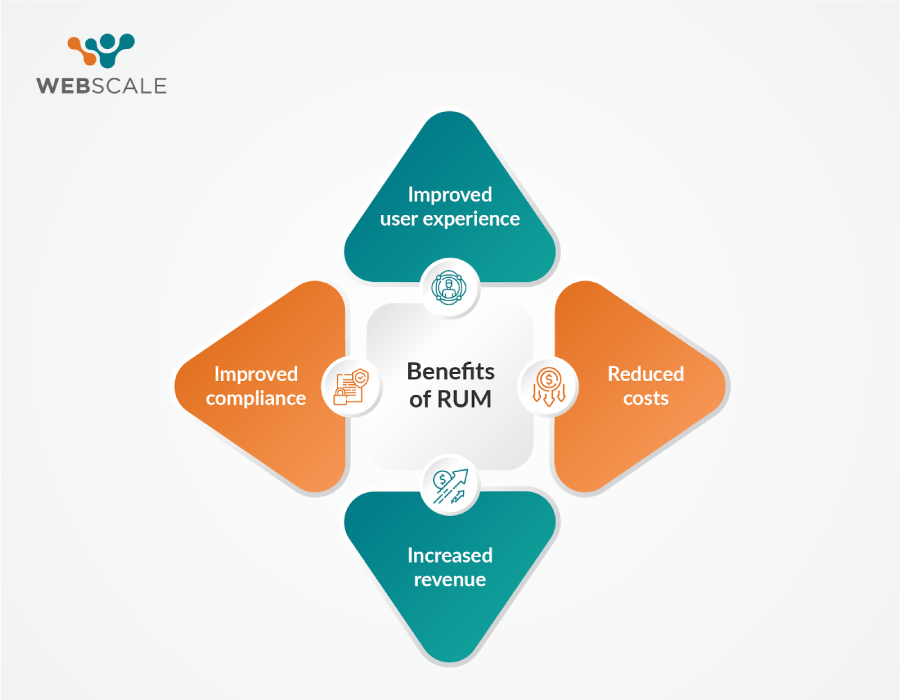
- Improved user experience: By identifying and fixing performance issues, RUM can help to improve the user experience. This can lead to increased customer satisfaction, loyalty, and retention.
- Reduced costs: By preventing downtime and outages, RUM can help to reduce costs associated with customer support, lost sales, and reputation damage.
- Increased revenue: By improving the user experience and reducing costs, RUM can help to increase revenue.
- Improved compliance: By monitoring performance and ensuring that SLAs are met, RUM can help to improve compliance with regulatory requirements.
What are the Challenges of Using RUM?
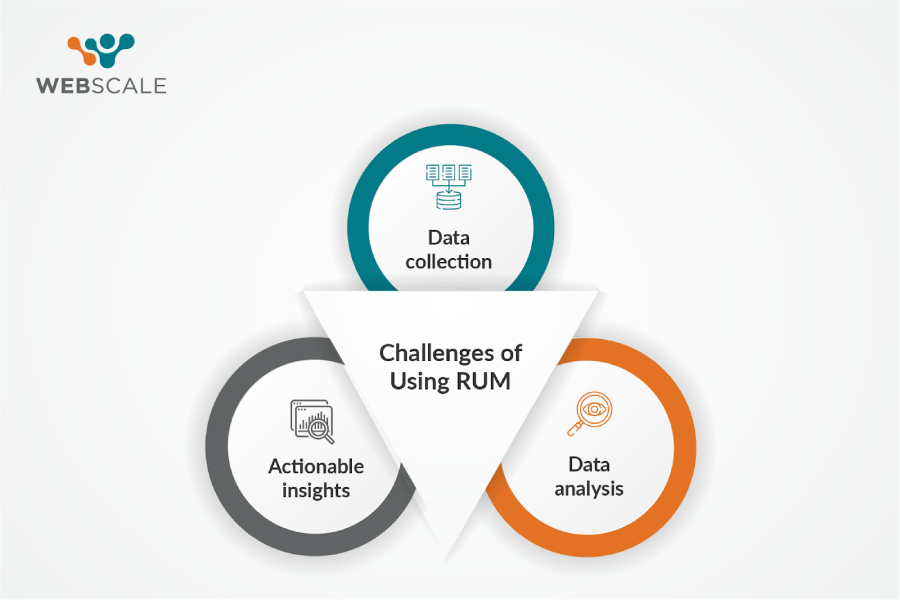
- Data collection: Collecting data from users’ browsers can be challenging, as it requires the use of JavaScript snippets, browser extensions, or server-side logs. This can also impact the performance of the website or application.
- Data analysis: Analyzing the data collected by RUM can be challenging, as it can be large and complex. This requires the use of specialized tools and expertise to collate data in a way that can be better understood and is more relevant to the business.
- Actionable insights: The data collected by RUM can be difficult to translate into actionable insights. This requires a deep understanding of the website or application, as well as the ability to identify trends and patterns.
How can I get Started with RUM?
Ecommerce businesses can benefit greatly from outsourcing real user monitoring (RUM) management to an intelligent CloudOps provider. Intelligent CloudOps is a modern version of a traditional managed service provider, that uses the latest technology to drive a more successful managed services practice. Outsourcing complex RUM implementation can provide a number of advantages.
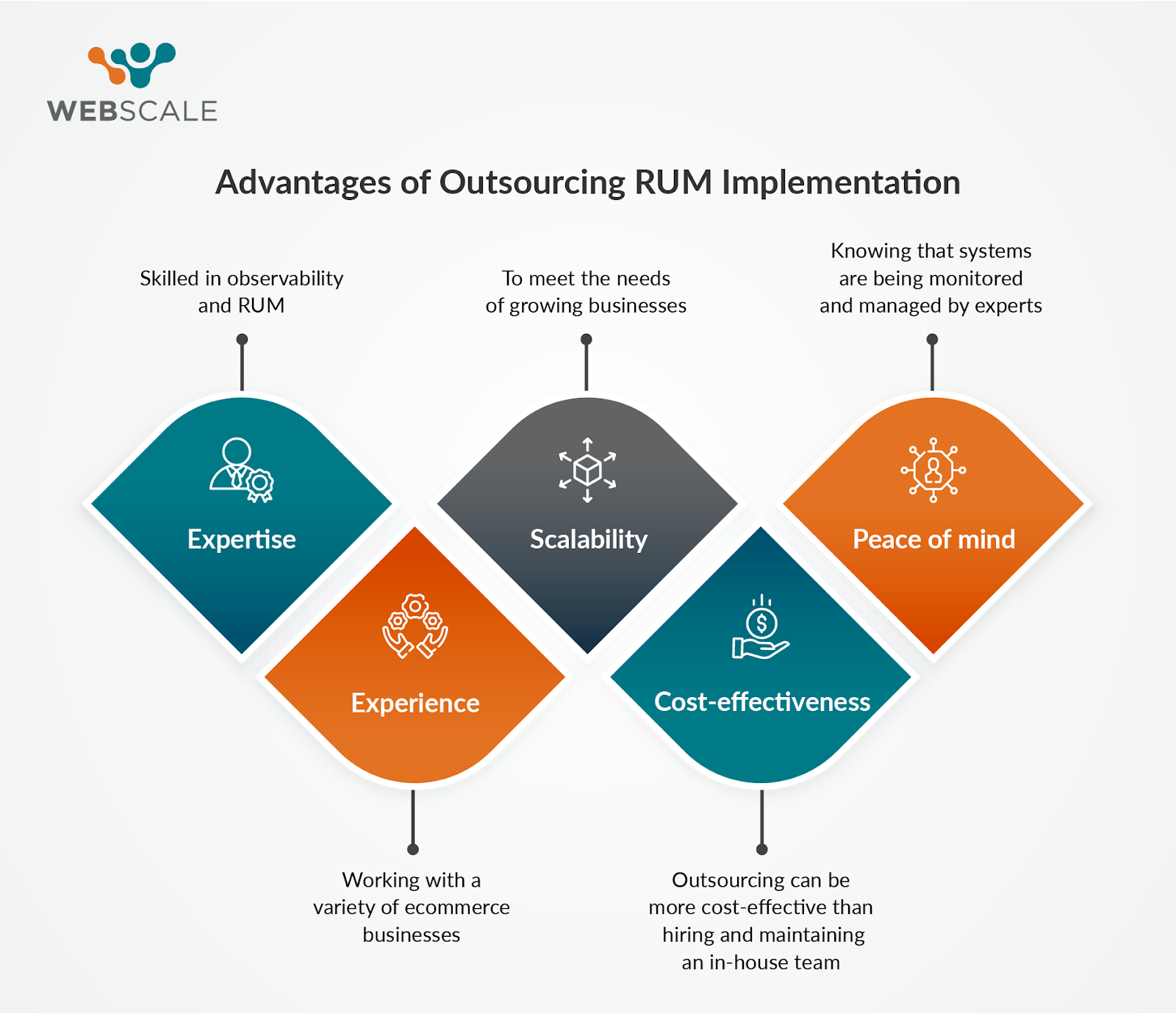
- Expertise: An Intelligent CloudOps provider will have a team of experts who are skilled in observability and RUM. This means that businesses can be confident that their systems are being monitored and managed by the best possible people.
- Experience: They will have experience working with a variety of ecommerce businesses. This means that they will be familiar with the challenges that ecommerce businesses face and will be able to provide tailored solutions.
- Scalability: Intelligent CloudOps can scale services to meet the needs of growing businesses. This means that businesses can be confident that their observability and RUM needs will be met as they become more successful.
- Cost-effectiveness: Outsourcing observability and RUM management can be more cost-effective than hiring and maintaining an in-house team. This is because an intelligent CloudOps provider can spread the cost of their expertise and experience across multiple businesses.
- Peace of mind: By outsourcing observability and RUM management to a provider, businesses can free up their internal resources to focus on other areas of their business. This can give businesses peace of mind knowing that their systems are being monitored and managed by experts, without having to be burdened with the uncertainties of retaining internal tech talent needed to maintain business continuity.
RUM is a valuable tool that can be used to improve the user experience, but the complexities of implementing tools, gathering data, analyzing the data and mapping the data back to business attributions can be a steep learning curve and expensive to recruit the right talent to make it all work. This is why ecommerce businesses should consider outsourcing observability and RUM management to an intelligent cloud ops provider. A technology enabled MSP with domain knowledge of the ecommerce and digital experience landscape can provide a number of advantages, including expertise, experience, scalability, cost-effectiveness, peace of mind, and more importantly, increased revenue.









